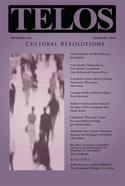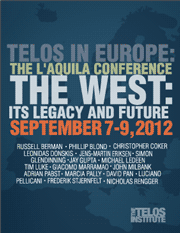By Paul Grenier · Friday, September 7, 2018 Are the divisions that fragment the United States primarily driven by some deep flaw in its political life, or was the United States doing just fine, thank you very much—until Russia came along during the 2016 presidential race and started sowing division and dissension?
Framed that way, the question answers itself. Whatever some state-sanctioned Russian actors may have done to pester the American political process, it is obvious that America’s deep divisions exist for reasons having essentially nothing to do with Russia. They long precede the last election.
Even if Russia’s interventions into American electoral politics turn out to be more significant than they presently appear, this cannot change the more fundamental reality that our confrontational posture, including vis-à-vis Russia, is by no means something external to the United States’ Lockean liberal political concept.
Continue reading →
By Jörg Friedrichs · Thursday, August 8, 2013 Jörg Friedrichs’s “Global Islamism and World Society” appears in Telos 163 (Summer 2013). Read the full version online at the Telos Online website, or purchase a print copy of the issue in our store.
 The piece is an eye-opener on contestation between global Islamism and cosmopolitan world society. It develops a comprehensive understanding of the former as the communitarian mirror image of the latter. Global Islamism and cosmopolitan world society are presented as varieties of globalization. The objective is to understand global Islamism as a political project and to assess its chances of successfully competing against cosmopolitan world society. This is accomplished by a comparative assessment of the degree to which either of them can achieve social integration, which is a prerequisite for the success of any political project. World society thrives on established forms of political and legal integration, and is buttressed by integration via functional subsystems. Global Islamism relies on the expectation of strong communal engagement and the unapologetic exclusion of dissidents and outsiders. It turns out that global Islamism’s bolder discriminatory practices are a two-edged sword because they also lead to internal divisions, and that global Islamism is not stronger than world society with regard to sociability. Insofar as the integration of Muslims into a universal community of believers is even more utopian than the realization of cosmopolitan world society, global Islamism is at a serious competitive disadvantage and thus bound to be frustrated. Until that happens, conflict between global Islamism and world society will continue to pose significant challenges. It is hoped that these challenges may be better managed when both are recognized as rival globalization projects, and when their mutual incompatibilities are acknowledged. The piece is an eye-opener on contestation between global Islamism and cosmopolitan world society. It develops a comprehensive understanding of the former as the communitarian mirror image of the latter. Global Islamism and cosmopolitan world society are presented as varieties of globalization. The objective is to understand global Islamism as a political project and to assess its chances of successfully competing against cosmopolitan world society. This is accomplished by a comparative assessment of the degree to which either of them can achieve social integration, which is a prerequisite for the success of any political project. World society thrives on established forms of political and legal integration, and is buttressed by integration via functional subsystems. Global Islamism relies on the expectation of strong communal engagement and the unapologetic exclusion of dissidents and outsiders. It turns out that global Islamism’s bolder discriminatory practices are a two-edged sword because they also lead to internal divisions, and that global Islamism is not stronger than world society with regard to sociability. Insofar as the integration of Muslims into a universal community of believers is even more utopian than the realization of cosmopolitan world society, global Islamism is at a serious competitive disadvantage and thus bound to be frustrated. Until that happens, conflict between global Islamism and world society will continue to pose significant challenges. It is hoped that these challenges may be better managed when both are recognized as rival globalization projects, and when their mutual incompatibilities are acknowledged.
Continue reading →
By Alessandro Vitale · Friday, January 25, 2013 The following paper was presented at Telos in Europe: The L’Aquila Conference, held on September 7-9, 2012, in L’Aquila, Italy.
 “Russia and the West” is a topic that never seems to be exhausted, and as a question, one that can never be answered satisfactorily. People and intellectuals use a staggering number of criteria to determine Russia’s suitability (or lack thereof) to be counted “Western,” ranging from the geographic and the linguistic to the political and institutional. For centuries, Russians have wondered if they are part of “Europe.” It is evident that geographically and culturally they are “Eurasians.” In any case, about three-quarters of the Russian population live west of the Urals, in what has always been considered a part of Europe. Russia has been connected to Europe for centuries. All the important movements, relevant things that Russia has made in history, have been through its connection to Europe. Russia has really been and remains an important part of Europe. But Russia is not only Europe. “Russia and the West” is a topic that never seems to be exhausted, and as a question, one that can never be answered satisfactorily. People and intellectuals use a staggering number of criteria to determine Russia’s suitability (or lack thereof) to be counted “Western,” ranging from the geographic and the linguistic to the political and institutional. For centuries, Russians have wondered if they are part of “Europe.” It is evident that geographically and culturally they are “Eurasians.” In any case, about three-quarters of the Russian population live west of the Urals, in what has always been considered a part of Europe. Russia has been connected to Europe for centuries. All the important movements, relevant things that Russia has made in history, have been through its connection to Europe. Russia has really been and remains an important part of Europe. But Russia is not only Europe.
Continue reading →
|
|
 The piece is an eye-opener on contestation between global Islamism and cosmopolitan world society. It develops a comprehensive understanding of the former as the communitarian mirror image of the latter. Global Islamism and cosmopolitan world society are presented as varieties of globalization. The objective is to understand global Islamism as a political project and to assess its chances of successfully competing against cosmopolitan world society. This is accomplished by a comparative assessment of the degree to which either of them can achieve social integration, which is a prerequisite for the success of any political project. World society thrives on established forms of political and legal integration, and is buttressed by integration via functional subsystems. Global Islamism relies on the expectation of strong communal engagement and the unapologetic exclusion of dissidents and outsiders. It turns out that global Islamism’s bolder discriminatory practices are a two-edged sword because they also lead to internal divisions, and that global Islamism is not stronger than world society with regard to sociability. Insofar as the integration of Muslims into a universal community of believers is even more utopian than the realization of cosmopolitan world society, global Islamism is at a serious competitive disadvantage and thus bound to be frustrated. Until that happens, conflict between global Islamism and world society will continue to pose significant challenges. It is hoped that these challenges may be better managed when both are recognized as rival globalization projects, and when their mutual incompatibilities are acknowledged.
The piece is an eye-opener on contestation between global Islamism and cosmopolitan world society. It develops a comprehensive understanding of the former as the communitarian mirror image of the latter. Global Islamism and cosmopolitan world society are presented as varieties of globalization. The objective is to understand global Islamism as a political project and to assess its chances of successfully competing against cosmopolitan world society. This is accomplished by a comparative assessment of the degree to which either of them can achieve social integration, which is a prerequisite for the success of any political project. World society thrives on established forms of political and legal integration, and is buttressed by integration via functional subsystems. Global Islamism relies on the expectation of strong communal engagement and the unapologetic exclusion of dissidents and outsiders. It turns out that global Islamism’s bolder discriminatory practices are a two-edged sword because they also lead to internal divisions, and that global Islamism is not stronger than world society with regard to sociability. Insofar as the integration of Muslims into a universal community of believers is even more utopian than the realization of cosmopolitan world society, global Islamism is at a serious competitive disadvantage and thus bound to be frustrated. Until that happens, conflict between global Islamism and world society will continue to pose significant challenges. It is hoped that these challenges may be better managed when both are recognized as rival globalization projects, and when their mutual incompatibilities are acknowledged.  “Russia and the West” is a topic that never seems to be exhausted, and as a question, one that can never be answered satisfactorily. People and intellectuals use a staggering number of criteria to determine Russia’s suitability (or lack thereof) to be counted “Western,” ranging from the geographic and the linguistic to the political and institutional. For centuries, Russians have wondered if they are part of “Europe.” It is evident that geographically and culturally they are “Eurasians.” In any case, about three-quarters of the Russian population live west of the Urals, in what has always been considered a part of Europe. Russia has been connected to Europe for centuries. All the important movements, relevant things that Russia has made in history, have been through its connection to Europe. Russia has really been and remains an important part of Europe. But Russia is not only Europe.
“Russia and the West” is a topic that never seems to be exhausted, and as a question, one that can never be answered satisfactorily. People and intellectuals use a staggering number of criteria to determine Russia’s suitability (or lack thereof) to be counted “Western,” ranging from the geographic and the linguistic to the political and institutional. For centuries, Russians have wondered if they are part of “Europe.” It is evident that geographically and culturally they are “Eurasians.” In any case, about three-quarters of the Russian population live west of the Urals, in what has always been considered a part of Europe. Russia has been connected to Europe for centuries. All the important movements, relevant things that Russia has made in history, have been through its connection to Europe. Russia has really been and remains an important part of Europe. But Russia is not only Europe. 






